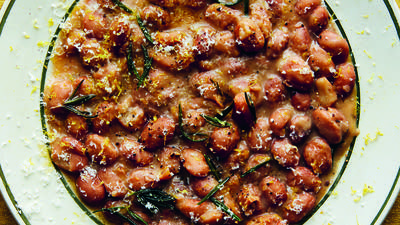
Amy Thielen reads an excerpt from her book Give a Girl a Knife, a memoir recounting the many struggles -- and support -- she encountered during her years of working in restaurant kitchens.
If Julie’s predecessors, such as T1, had taught me to cook well fast, she taught me to cook well even faster, and for bigger numbers.
I was in the vegetable walk-in at the end of my shift organizing my day’s prep when she came in. She leaped up to the top shelves to grab a nearly empty box of watercress, then the last of the carrot carton and a half-gone box of limes, manically taking to heart her own advice to keep things neat, and pitched everything violently into the center like she was making a pile for a bonfire. Something was really stoking her.
“I’m just so sick of this crap!”
Either she was taking the nearly empty vegetable boxes way too personally or she was choosing this moment to reveal something to me—but I shouldn’t have been surprised, because we were in the walk-in. Displays of emotion had no place in the kitchen, but the minute the walk-in cooler’s massive vault door sucked shut, the coast was clear. It was the private inner sanctum of the kitchen, equal to a therapist’s couch. Like wolves howling into the arctic night, cooks stood in the purifying freezing air and expressed themselves, snatching a moment to slowly grab herbs and share their grievances, to disgorge some burning kitchen gossip, or, like Julie, to angrily smash every nearly empty box to the floor and unleash her hot fury, which steamed off her in waves in the cold fan-powered wind.
When she found a metal six-pan of white beans soaking, the wrinkly top beans rising up above the waterline, she started railing—not at me, but at some nonpresent incorrigible someone.
“These beans are improperly soaked!” She could have just said that someone didn’t use enough water to cover them, but for her the incompetence went deeper than that. The amount of water wasn’t just insufficient, it was improper. It offended her kitchen ethic.
“Not mine!” I backed up.
“Shut up, I know they’re not yours. Do you cook beans?” she taunted, shaking the six-pan. We both knew I did not.
 Give a Girl a Knife
by Amy Thielen
Give a Girl a Knife
by Amy Thielen
Julie threw her head back in the air and spun for the exit. “Thirty-one years old and I’m still doing this fucking veg shit!” she said, punching the button to open the door. The air pressure gasped, releasing her to the outside.
I made a quick deduction that she hadn’t been promoted to the meat station, recently vacated by the giant I-forget-his-name-now guy, the sweaty one who kept the tip of his rolled-up tongue pressed to his top lip during service in a state of pure concentration. For some reason, you rarely saw chefs assign women to cook the main protein, even if that woman was a sous chef. Sometimes the fish, but never the meat.
Honestly, it didn’t make sense to me, though. It seemed that Chef Jean-François trusted Julie. We all liked him. He was a fair guy. I looked around the kitchen at all the cooks’ moving, bumping, swirling shapes and thought, It wasn’t that Jean-François, or most of the male chefs, meant to be sexist. What was going on here was actually worse. It was a failure of the imagination. Promoting a cook to a position of greater responsibility involved squinting at that cook to see if you could imagine him (or her), as they said, “stepping up” into the harder job. It was the lazy side of cowardice: when the chefs looked back in time to their own line-cooking youths, they fondly remembered their own chefs squinting at them and gauging them sufficiently ready to step up, so they promoted the guy. Pleased with themselves to close this circle, they failed to see that it was an unfair eternal cycle.
Or maybe I was being too generous. They also knew the girls would take the sideways promotions to fill the stations that needed filling, good strong girls that they were. So capable and uncomplaining, just like a mother.
When I walked out, Julie was heatedly discussing this issue with Faye, our thirty-something “junior” sous chef. They broke the huddle when they saw me. The last thing they wanted was an all-witch bitchfest. They were too smart to dilute their power by embracing their lessers.
By the end of my seven years in Manhattan kitchens, I’d come to feel their pain. Like them, I nearly always worked the vegetable station and never the roast. Always a bridesmaid, never a groom. Only later did I realize that the vegetable station—the entremet—which I thought of as my gender-specific bondage, would be my revelation.
Reprinted with permission from Clarkson Potter.
Before you go...
Each week, The Splendid Table brings you stories that expand your world view, inspire you to try something new, and show how food connects us all. We rely on your generous support. For as little as $5 a month, you can have a lasting impact on The Splendid Table. And, when you donate, you’ll join a community of like-minded individuals who love good food, good conversation, and kitchen companionship. Show your love for The Splendid Table with a gift today.
Thank you for your support.
Donate today for as little as $5.00 a month. Your gift only takes a few minutes and has a lasting impact on The Splendid Table and you'll be welcomed into The Splendid Table Co-op.



